1. Applied Ontologies in the Neuro-Symbolic Age
This panel will take place at the online part of FOIS.
MODERATOR
- Mehwish Alam
Panelists
- Pascal Hitzler (Kansas State University)
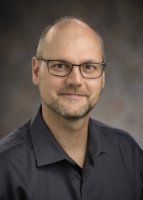 Pascal Hitzler is Professor and endowed Lloyd T. Smith Creativity in Engineering Chair and Director of the Center for Artificial Intelligence and Data Science (CAIDS) at the Department of Computer Science at Kansas State University. Until July 2019 he was endowed NCR Distinguished Professor, Brage Golding Distinguished Professor of Research, and Director of Data Science at the Department of Computer Science and Engineering at Wright State University in Dayton, Ohio, U.S.A. He is director of the Data Semantics (DaSe) Lab. From 2004 to 2009, he was Akademischer Rat at the Institute for Applied Informatics and Formal Description Methods (AIFB) at the University of Karlsruhe in Germany, and from 2001 to 2004 he was postdoctoral researcher at the Artificial Intelligence institute at TU Dresden in Germany. In 2001 he obtained a PhD in Mathematics from the National University of Ireland, University College Cork, and in 1998 a Diplom (Master equivalent) in Mathematics from the University of Tübingen in Germany. His research record lists over 400 publications in such diverse areas as semantic web, artificial intelligence, neural-symbolic integration, knowledge representation and reasoning, machine learning, denotational semantics, and set-theoretic topology. His research is highly cited. He is founding Editor-in-chief of the Semantic Web journal, the leading journal in the field, of the new Neurosymbolic Artificial Intelligence journal, and of the IOS Press book series Studies on the Semantic Web. He is co-author of the W3C Recommendation OWL 2 Primer, and of the book Foundations of Semantic Web Technologies by CRC Press, 2010, which was named as one out of seven Outstanding Academic Titles 2010 in Information and Computer Science by the American Library Association's Choice Magazine, and has translations into German and Chinese. He is on the editorial board of several journals and book series and a founding steering committee member of the Neural-Symbolic Learning and Reasoning Association and the Association for Ontology Design and Patterns, and he frequently acts as conference chair in various functions. For more information about him, see https://people.cs.ksu.edu/~hitzler/
Pascal Hitzler is Professor and endowed Lloyd T. Smith Creativity in Engineering Chair and Director of the Center for Artificial Intelligence and Data Science (CAIDS) at the Department of Computer Science at Kansas State University. Until July 2019 he was endowed NCR Distinguished Professor, Brage Golding Distinguished Professor of Research, and Director of Data Science at the Department of Computer Science and Engineering at Wright State University in Dayton, Ohio, U.S.A. He is director of the Data Semantics (DaSe) Lab. From 2004 to 2009, he was Akademischer Rat at the Institute for Applied Informatics and Formal Description Methods (AIFB) at the University of Karlsruhe in Germany, and from 2001 to 2004 he was postdoctoral researcher at the Artificial Intelligence institute at TU Dresden in Germany. In 2001 he obtained a PhD in Mathematics from the National University of Ireland, University College Cork, and in 1998 a Diplom (Master equivalent) in Mathematics from the University of Tübingen in Germany. His research record lists over 400 publications in such diverse areas as semantic web, artificial intelligence, neural-symbolic integration, knowledge representation and reasoning, machine learning, denotational semantics, and set-theoretic topology. His research is highly cited. He is founding Editor-in-chief of the Semantic Web journal, the leading journal in the field, of the new Neurosymbolic Artificial Intelligence journal, and of the IOS Press book series Studies on the Semantic Web. He is co-author of the W3C Recommendation OWL 2 Primer, and of the book Foundations of Semantic Web Technologies by CRC Press, 2010, which was named as one out of seven Outstanding Academic Titles 2010 in Information and Computer Science by the American Library Association's Choice Magazine, and has translations into German and Chinese. He is on the editorial board of several journals and book series and a founding steering committee member of the Neural-Symbolic Learning and Reasoning Association and the Association for Ontology Design and Patterns, and he frequently acts as conference chair in various functions. For more information about him, see https://people.cs.ksu.edu/~hitzler/ - Pawel Garbacz (The John Paul II Catholic University of Lublin)
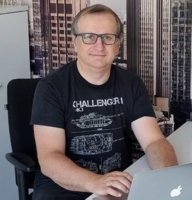 Pawel Garbacz has extensive experience in both industry and research roles, specializing in ontology and semantic web technology development. Since 2021, he has served as a technical lead at MakoLab, overseeing DevOps infrastructure for collaborative ontology projects, including the FIBO, IDMP, and NIST ontologies, and acting as an Open Knowledge Graph trainer. From 2017 to 2021, he worked as a semantic web technology developer at MakoLab, focusing on the design of an ontology-driven search engine and machine learning for supervisory reporting. His role as principal ontologist at BORO Solutions from 2006 to 2021 involved contributions to the National Digital Twin programme, reengineering legacy systems for Shell UK and QinetiQ, and developing data quality tools. His technical skills encompass proficiency in Python, Java, and C#, numerous knowledge representation languages, and a variety of software and technologies related to databases, programming, and text analysis. Pawel has published several papers on various topics in logic and philosophical and applied ontology, e.g., on relative identity, technical artefacts, philosophical issues in mereology, metaontological frameworks for applied ontologies, historical settlements, use of automatic reasoners in philosophy and applied ontology.
Pawel Garbacz has extensive experience in both industry and research roles, specializing in ontology and semantic web technology development. Since 2021, he has served as a technical lead at MakoLab, overseeing DevOps infrastructure for collaborative ontology projects, including the FIBO, IDMP, and NIST ontologies, and acting as an Open Knowledge Graph trainer. From 2017 to 2021, he worked as a semantic web technology developer at MakoLab, focusing on the design of an ontology-driven search engine and machine learning for supervisory reporting. His role as principal ontologist at BORO Solutions from 2006 to 2021 involved contributions to the National Digital Twin programme, reengineering legacy systems for Shell UK and QinetiQ, and developing data quality tools. His technical skills encompass proficiency in Python, Java, and C#, numerous knowledge representation languages, and a variety of software and technologies related to databases, programming, and text analysis. Pawel has published several papers on various topics in logic and philosophical and applied ontology, e.g., on relative identity, technical artefacts, philosophical issues in mereology, metaontological frameworks for applied ontologies, historical settlements, use of automatic reasoners in philosophy and applied ontology. - Fabian Neuhaus (Otto von Guericke University Magdeburg)
Fabian Neuhaus is a senior researcher at the Otto-von-Guericke University Magdeburg, Germany. His main research interests include ontology engineering, languages, and neurosymbolic integration. He has been a member of the Executive Council of the International Association for Ontology and its Applications (IAOA) since 2013 and its vice-president since 2021. After Fabian Neuhaus received his Ph.D in philosophy at Humboldt University, Berlin, in 2002, he worked on topics in formal ontology and applied ontology in the life sciences first at the Institute for Formal Ontology and Medical Information Science at Saarland University and as part of the National Center for Biomedical Ontology at SUNY Buffalo. In this period he contributed to the Basic Formal Ontology, co-authored the Relation Ontology and collaboration with researchers in the life sciences in the development of domain ontologies. Between 2006 and 2013 Fabian Neuhaus was a guest researcher at the National Institute of Standards and Technology (NIST), Gaithersburg, MD, USA, where he participated as knowledge representation expert on a variety of projects covering a broad range of topics including data integration in supply chain management, design of a repository for disaster research, knowledge acquisition with the help of controlled English, and ontology evaluation. In addition, Dr. Neuhaus participated in the standardization of ISO Common Logic and OMG's Distributed Ontology Model and Specification Language. Since 2013 Fabian Neuhaus has been a senior researcher at the Faculty for Computer Science of the Otto-von-Guericke University Magdeburg, Germany, where he teaches logic and knowledge representation courses, and received his habilitation in 2019. He has been involved in the development of the Open Energy Ontology. During the last few years, his primary research interest has been the use of neural networks for ontology extension and ontologies as background knowledge for machine learning, with particular applications in chemistry and material science.
- Luciano Serafini (Fondazione Bruno Kessler)
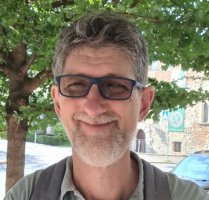 Luciano Serafini is a researcher in the area of Artificial Intelligence. He is currently the head of the Data and Knowledge Management Research Unit at Fondazione Bruno Kessler. He graduated in information science with a thesis on logic for knowledge representation. Since 1990 he joined Fondazione Bruno Kessler (before ITC-IRST) as a researcher in the area of logic for knowledge representation and reasoning. During more than 30 years of research career he contributes with few important ideas in the field of Artificial Intelligence. In the 90's he contributed to the definition of a formalism called Multi-Context (MC) System for the representation of modular interconnected context-dependent knowledge. MC Systems has a great influence on the semantic web area and in the area of information integration. Between 2000-2010 he worked on semantic matching for the integration of heterogeneous schemas with other researchers in Trento who suggested encoding the problem of matching heterogeneous hierarchical classifications in terms of propositional satisfiability. After 2010, Luciano Serafini started his research about integrating machine learning and logical reasoning, and in 2016 he contributed to the definition of Logic Tensor Network, one of the first neuro-symbolic architectures. In the last few years, he also has been interested in integrating learning, acting, and planning. His current interests include Embodied Artificial Intelligence, Neuro-Symbolic Integration, Statistical Relational Learning, and integrating Planning, Acting, Perception, and Reasoning. From 2020 he is an EurAI fellow and teaches regular courses on Knowledge representation and learning at the University of Padova.
Luciano Serafini is a researcher in the area of Artificial Intelligence. He is currently the head of the Data and Knowledge Management Research Unit at Fondazione Bruno Kessler. He graduated in information science with a thesis on logic for knowledge representation. Since 1990 he joined Fondazione Bruno Kessler (before ITC-IRST) as a researcher in the area of logic for knowledge representation and reasoning. During more than 30 years of research career he contributes with few important ideas in the field of Artificial Intelligence. In the 90's he contributed to the definition of a formalism called Multi-Context (MC) System for the representation of modular interconnected context-dependent knowledge. MC Systems has a great influence on the semantic web area and in the area of information integration. Between 2000-2010 he worked on semantic matching for the integration of heterogeneous schemas with other researchers in Trento who suggested encoding the problem of matching heterogeneous hierarchical classifications in terms of propositional satisfiability. After 2010, Luciano Serafini started his research about integrating machine learning and logical reasoning, and in 2016 he contributed to the definition of Logic Tensor Network, one of the first neuro-symbolic architectures. In the last few years, he also has been interested in integrating learning, acting, and planning. His current interests include Embodied Artificial Intelligence, Neuro-Symbolic Integration, Statistical Relational Learning, and integrating Planning, Acting, Perception, and Reasoning. From 2020 he is an EurAI fellow and teaches regular courses on Knowledge representation and learning at the University of Padova. - John Beverley (University of Buffalo)
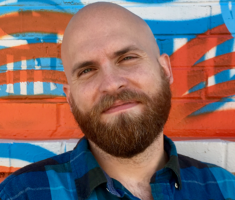 His work is at the intersection of ontology and knowledge graph engineering, formal logic, and machine learning, with applications to representations of infectious disease, top-level ontology modeling, and healthcare ethics. He obtained his PhD in philosophy from Northwestern University and previously worked at Johns Hopkins Applied Physics Laboratory as a senior ontologist, leveraging his knowledge representation skillset to support traditional machine learning workflows. He is presently an Assistant Professor at the University of Buffalo and Co-Director of the National Center for Ontological Research. He has worked with numerous groups curating, creating, and applying knowledge representation artifacts to semantic interoperability challenges, supporting efforts to identify vaccine and drug treatment options for COVID-19, updating the widely-used Infectious Disease Ontology, developing the Virus Disease Ontology extension, and developing the Coronavirus Infectious Disease Ontology which extends from it. He also worked extensively on Basic Formal Ontology (ISO/IEC 21838-2), used in the Open Biological and Biomedical Ontologies, Industrial Ontologies Foundry, and Common Core Ontologies suite.
His work is at the intersection of ontology and knowledge graph engineering, formal logic, and machine learning, with applications to representations of infectious disease, top-level ontology modeling, and healthcare ethics. He obtained his PhD in philosophy from Northwestern University and previously worked at Johns Hopkins Applied Physics Laboratory as a senior ontologist, leveraging his knowledge representation skillset to support traditional machine learning workflows. He is presently an Assistant Professor at the University of Buffalo and Co-Director of the National Center for Ontological Research. He has worked with numerous groups curating, creating, and applying knowledge representation artifacts to semantic interoperability challenges, supporting efforts to identify vaccine and drug treatment options for COVID-19, updating the widely-used Infectious Disease Ontology, developing the Virus Disease Ontology extension, and developing the Coronavirus Infectious Disease Ontology which extends from it. He also worked extensively on Basic Formal Ontology (ISO/IEC 21838-2), used in the Open Biological and Biomedical Ontologies, Industrial Ontologies Foundry, and Common Core Ontologies suite.
2. Digital transformation with ontologies: Enterprise cases of success
This panel will take place at the onsite part of FOIS.
In today’s complex and highly digitalized society, the importance of ontologies is increasingly acknowledged. This industry panel at FOIS 2024 will discuss cases in which formal ontologies play a clearly visible role in making digital transformation successful. The panelists are Quirien Wijnands (European Space Agency), Laura Daniele (TNO), Ivo Velitchkov (independent consultant), and Wouter Franke (The Hyve), with moderation by Mara Abel (UFRGS) and Jan Voskuil (Taxonic).
MODERATORS
- Jan Voskuil (Taxonic)
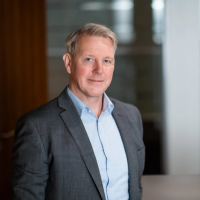 After obtaining a PhD in general linguistics about verb taxonomy in South-East Asian languages, Jan embarked on a career in IT, starting as a software developer in the 1990’s. Jan co-founded Taxonic in 2012. Taxonic is a consultancy that focusses on model driven architectures, including the application of Linked Data technologies to real world business problems. One of Jan’s main interests is formal ontology in the context of information systems. Jan is a consultant and has been involved in the creation of the TOOI-ontology for official government information since 2019 (https://standaarden.overheid.nl/tooi). Jan teaches courses on conceptual modeling and Linked Data and co-creates e-learning materials for Taxonic Academy, including a course on UFO and OntoUML targeting IT-professionals.
After obtaining a PhD in general linguistics about verb taxonomy in South-East Asian languages, Jan embarked on a career in IT, starting as a software developer in the 1990’s. Jan co-founded Taxonic in 2012. Taxonic is a consultancy that focusses on model driven architectures, including the application of Linked Data technologies to real world business problems. One of Jan’s main interests is formal ontology in the context of information systems. Jan is a consultant and has been involved in the creation of the TOOI-ontology for official government information since 2019 (https://standaarden.overheid.nl/tooi). Jan teaches courses on conceptual modeling and Linked Data and co-creates e-learning materials for Taxonic Academy, including a course on UFO and OntoUML targeting IT-professionals. - Mara Abel (UFRGS)
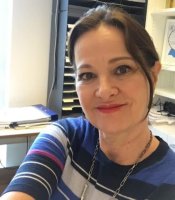 Mara Abel is a geologist and doctor in Computer Science, studying knowledge engineering applied to the Petroleum Industry. She is a retired full professor and invited researcher at UFRGS dedicated to knowledge management and knowledge engineering research for building ontologies in petroleum exploration and production areas. She is a co-founder of the knowledge-based software company ENDEEPER and has conceived several successful industrial applications for reservoir characterization and interoperability in industrial cooperation projects. She leads the PeTwin project (petwin.org) for semantic interoperability for digital twins for petroleum production plants.
Mara Abel is a geologist and doctor in Computer Science, studying knowledge engineering applied to the Petroleum Industry. She is a retired full professor and invited researcher at UFRGS dedicated to knowledge management and knowledge engineering research for building ontologies in petroleum exploration and production areas. She is a co-founder of the knowledge-based software company ENDEEPER and has conceived several successful industrial applications for reservoir characterization and interoperability in industrial cooperation projects. She leads the PeTwin project (petwin.org) for semantic interoperability for digital twins for petroleum production plants.
Panelists
- Laura Daniele (TNO)
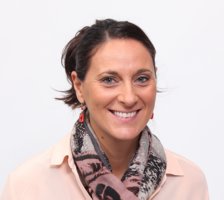 Laura Daniele graduated in Electronic Engineering from the University of Cagliari (Italy) and holds a PhD in Computer Science from the University of Twente (Netherlands). She is currently a senior scientist at TNO in the field of ontology engineering and semantic technologies. Her main interest is to provide data integration solutions to enable semantic interoperability among various stakeholders that need to share data, but use different terminologies, standards and heterogeneous IT systems/ technical platforms. She is the creator of the Smart Applications REFerence (SAREF) ontology (https://saref.etsi.org/) for the European Commission and standardized by ETSI. She is also co-leader of the Semantic Interoperability Expert Group in the Alliance for IoT and Edge Computing Innovation (AIOTI) and lead scientist in various European projects, such as the H2020 Interconnect and the HE Hedge-IoT projects, in which semantics is pivotal for the interoperability of data and standards across the domains of IoT, Smart Buildings and Grids.
Laura Daniele graduated in Electronic Engineering from the University of Cagliari (Italy) and holds a PhD in Computer Science from the University of Twente (Netherlands). She is currently a senior scientist at TNO in the field of ontology engineering and semantic technologies. Her main interest is to provide data integration solutions to enable semantic interoperability among various stakeholders that need to share data, but use different terminologies, standards and heterogeneous IT systems/ technical platforms. She is the creator of the Smart Applications REFerence (SAREF) ontology (https://saref.etsi.org/) for the European Commission and standardized by ETSI. She is also co-leader of the Semantic Interoperability Expert Group in the Alliance for IoT and Edge Computing Innovation (AIOTI) and lead scientist in various European projects, such as the H2020 Interconnect and the HE Hedge-IoT projects, in which semantics is pivotal for the interoperability of data and standards across the domains of IoT, Smart Buildings and Grids. - Quirien Wijnands (European Space Agency)
 Quirien Wijnands is a System Simulation Engineer with 20 years of experience in the field of Modelling and Simulation. Since 2003 he is supporting various space missions in the field of Functional Verification supported by modelling and simulation at the European Space Agency technology centre in Noordwijk, the Netherlands. This includes early phase feasibility studies, mission and system design, and verification and validation of the overall system. His current main mission is the Lunar Gateway project in context of Artemis.
Quirien Wijnands is a System Simulation Engineer with 20 years of experience in the field of Modelling and Simulation. Since 2003 he is supporting various space missions in the field of Functional Verification supported by modelling and simulation at the European Space Agency technology centre in Noordwijk, the Netherlands. This includes early phase feasibility studies, mission and system design, and verification and validation of the overall system. His current main mission is the Lunar Gateway project in context of Artemis.As of 2019 he is also heavily involved in the built of the Space System Ontology as an enabler for semantic interoperability between the numerous stakeholders that are involved in the construction and operations of a space mission. For this the OSMoSE initiative was created. Since end of 2023 Quirien is leading this group which has as task to harmonise and consolidate and integrate the incoming Universe of Discourses into this Space System Ontology.Besides work, his passion goes out to his 4 teenager and young adult kids, and his free time is filled with water sports, soccer, Buddhism, Stoic philosophy, and astronomy. After all; “we are all star-dust”, as Carl Sagan would say.
- Ivo Velitchkov (Independent Consultant)
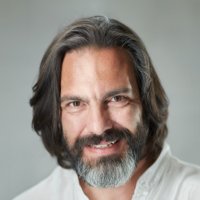 Ivo is an independent management and data consultant. For the last 30 years, he has worked with big public and private organizations, helping them with their strategy, structures and information. He has worked as a CEO, consultant, coach, project manager, researcher, and trainer. He’s the author of the books Personal Knowledge Graphs and Essential Balances, the blogs http://www.strategicstructures.com and https://www.linkandth.ink, and a couple of semantic technology wikis. He has a PhD in Computer Science.
Ivo is an independent management and data consultant. For the last 30 years, he has worked with big public and private organizations, helping them with their strategy, structures and information. He has worked as a CEO, consultant, coach, project manager, researcher, and trainer. He’s the author of the books Personal Knowledge Graphs and Essential Balances, the blogs http://www.strategicstructures.com and https://www.linkandth.ink, and a couple of semantic technology wikis. He has a PhD in Computer Science.Ivo has trained hundreds of people on how to use and apply semantic technologies and has helped large organizations unify their data in enterprise knowledge graphs.
- Wouter Franke (The Hyve)
 Wouter Franke is a Strategic Data Consultant at The Hyve with a background in Computer Science and Change Management. He has extensive experience with large implementations of data exchange programs in complex networks of public and private organisations. Since 2017 he has been working on both research and development, and the implementation of FAIR within data collaborations. He has among other things been responsible for the introduction of formal ontologies and conceptual modelling in the Dutch long term health care. His goal is to ensure data within healthcare are available to a wide range of stakeholders and can be interpreted by machines. The translation of academic developments into implementable products and services is one of his key interests, ultimately resulting in better prevention and healthcare systems.
Wouter Franke is a Strategic Data Consultant at The Hyve with a background in Computer Science and Change Management. He has extensive experience with large implementations of data exchange programs in complex networks of public and private organisations. Since 2017 he has been working on both research and development, and the implementation of FAIR within data collaborations. He has among other things been responsible for the introduction of formal ontologies and conceptual modelling in the Dutch long term health care. His goal is to ensure data within healthcare are available to a wide range of stakeholders and can be interpreted by machines. The translation of academic developments into implementable products and services is one of his key interests, ultimately resulting in better prevention and healthcare systems.
3. Ontologies, Creativity and AI
This panel will take place at the onsite part of FOIS.
MODERATOR
- Renata Guizzardi (University of Twente)
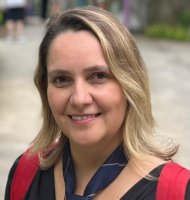 Renata is currently an Assistant Professor at the Industrial Engineering and Business Information Systems group, at the University of Twente, in the Netherlands (since 2020). Previously, she was a founding member of the Ontology & Conceptual Modeling Research Group (NEMO) and of the Laboratory of Supporting Technologies for Collaborative Networks (LabTAR), at UFES, Brazil, where she was based from 2009-2016. She has been visiting scholar at the Bruno Kessler Foundation (FBK) in 2006 and 2018, and at the University of Trento in 2013-2014, Italy. In 2018, I was an Senior Associate Researcher at the University of Bristol, UK and in 2019, she was a lecturer at the University of Trento, Italy. Renata has investigated for the past 20 years the interplay of Conceptual Modeling (especially Ontologies) and Requirements Engineering. Her most recent research focuses on ontology-based requirements engineering of ethical systems.
Renata is currently an Assistant Professor at the Industrial Engineering and Business Information Systems group, at the University of Twente, in the Netherlands (since 2020). Previously, she was a founding member of the Ontology & Conceptual Modeling Research Group (NEMO) and of the Laboratory of Supporting Technologies for Collaborative Networks (LabTAR), at UFES, Brazil, where she was based from 2009-2016. She has been visiting scholar at the Bruno Kessler Foundation (FBK) in 2006 and 2018, and at the University of Trento in 2013-2014, Italy. In 2018, I was an Senior Associate Researcher at the University of Bristol, UK and in 2019, she was a lecturer at the University of Trento, Italy. Renata has investigated for the past 20 years the interplay of Conceptual Modeling (especially Ontologies) and Requirements Engineering. Her most recent research focuses on ontology-based requirements engineering of ethical systems.
Panelists
- Maria Hedblom (Jönköping University)
 In 2018, Hedblom got a Dr Eng in Theoretical Computer Science at the Otto-von-Guericke University Magdeburg, Germany. Before that, she received an MSc in Cognitive Science at Linköping University, Sweden. She also took part in a tech-start up on generative AI for photo manipulation in Vienna, Austria. Her main research topics concern cognitively-inspired AI, spatiotemporal reasoning, computational creativity and commonsense reasoning. Her most prominent contribution concerns her formal work on integrating linguistic and psychological theories on image schemas into AI frameworks.
In 2018, Hedblom got a Dr Eng in Theoretical Computer Science at the Otto-von-Guericke University Magdeburg, Germany. Before that, she received an MSc in Cognitive Science at Linköping University, Sweden. She also took part in a tech-start up on generative AI for photo manipulation in Vienna, Austria. Her main research topics concern cognitively-inspired AI, spatiotemporal reasoning, computational creativity and commonsense reasoning. Her most prominent contribution concerns her formal work on integrating linguistic and psychological theories on image schemas into AI frameworks. - Guendalina Righetti (University of Oslo)
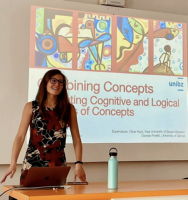 Guendalina Righetti is a postdoctoral researcher at the University of Oslo, working on the ERC project C:FORS: Construction in the Formal Sciences, where she is working on the work package involving applying constructional approaches from the foundation of mathematics to formal and applied ontology. She earned her PhD in Computer Science at the University of Bozen-Bolzano, with a thesis focusing on the representation of cognitive models of concepts within Description Logics and Knowledge Representation. Before that, she gained a Master’s Degree in Philosophy at Università degli Studi di RomaTre, Rome (Italy), and a Master’s Degree in Mathematics (curriculum Mathématiques Discrètes et Fondements de l’informatique) at the University of Aix-Marseille, Marseilles (France). Her research interests are in Knowledge Representation and cognitive AI, at the intersection of logic, cognitive sciences and applied ontology.
Guendalina Righetti is a postdoctoral researcher at the University of Oslo, working on the ERC project C:FORS: Construction in the Formal Sciences, where she is working on the work package involving applying constructional approaches from the foundation of mathematics to formal and applied ontology. She earned her PhD in Computer Science at the University of Bozen-Bolzano, with a thesis focusing on the representation of cognitive models of concepts within Description Logics and Knowledge Representation. Before that, she gained a Master’s Degree in Philosophy at Università degli Studi di RomaTre, Rome (Italy), and a Master’s Degree in Mathematics (curriculum Mathématiques Discrètes et Fondements de l’informatique) at the University of Aix-Marseille, Marseilles (France). Her research interests are in Knowledge Representation and cognitive AI, at the intersection of logic, cognitive sciences and applied ontology. - Shenghui Wang (University of Twente)
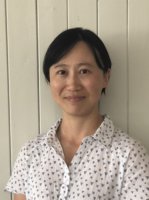 Shenghui Wang is an assistant professor in the Human Media Interaction (HMI) group at the University of Twente. Her current research focuses on developing language technologies that facilitate interactive communication between humans and knowledge, with a particular emphasis on making Cultural Heritage more inclusive and interactive. She is affiliated with the Hybrid Intelligence Centre, where she works on designing Hybrid Intelligence systems.
Shenghui Wang is an assistant professor in the Human Media Interaction (HMI) group at the University of Twente. Her current research focuses on developing language technologies that facilitate interactive communication between humans and knowledge, with a particular emphasis on making Cultural Heritage more inclusive and interactive. She is affiliated with the Hybrid Intelligence Centre, where she works on designing Hybrid Intelligence systems.Before joining the University of Twente, Shenghui was a Research Scientist at OCLC, where she explored the potential of NLP, Data Science, and visualization technologies to address challenges in the library and Cultural Heritage sectors. She also worked at Vrije Universiteit Amsterdam and Wageningen University, applying Semantic Web and NLP technologies to improve semantic interoperability in the Cultural Heritage and Agrifood research domains.
Shenghui earned her Ph.D. in Computer Science from the University of Manchester (Manchester, UK), a Master’s degree in Computer Application Technology from the University of Science and Technology of China (Hefei, China), and a Bachelor’s degree in Computer Science from Anhui University (Hefei, China).
- Greta Adamo (Basque Center for Climate Change)
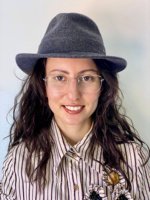 Dr. Adamo is an Italian philosopher and ontologist. She received a PhD in Computer Science and Systems Engineering from the University of Genoa (IT) and Fondazione Bruno Kessler (IT), working with the Process and Data Intelligence research unit. Following her PhD, Dr. Adamo has specialised in social-environmental sustainability research, beginning with a postdoc at ITI/LARSyS in Madeira island (PT) with the project REDEMA, Redesigning Madeira: Using Speculative Design to Re-Think Energy Policy and Consumer Behavior, and through her current postdoctoral research at the Basque Centre for Climate Change (ES) contributing to the ARIES (ARtificial Intelligence for Environment & Sustainability) project. Her research focuses on applied ontology, conceptual modelling, human factors, philosophy of technology, and integration of key concepts associated with sustainability and climate change.
Dr. Adamo is an Italian philosopher and ontologist. She received a PhD in Computer Science and Systems Engineering from the University of Genoa (IT) and Fondazione Bruno Kessler (IT), working with the Process and Data Intelligence research unit. Following her PhD, Dr. Adamo has specialised in social-environmental sustainability research, beginning with a postdoc at ITI/LARSyS in Madeira island (PT) with the project REDEMA, Redesigning Madeira: Using Speculative Design to Re-Think Energy Policy and Consumer Behavior, and through her current postdoctoral research at the Basque Centre for Climate Change (ES) contributing to the ARIES (ARtificial Intelligence for Environment & Sustainability) project. Her research focuses on applied ontology, conceptual modelling, human factors, philosophy of technology, and integration of key concepts associated with sustainability and climate change.
